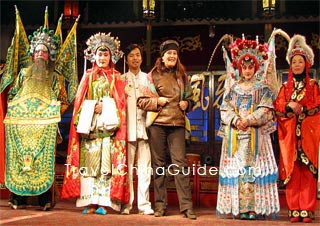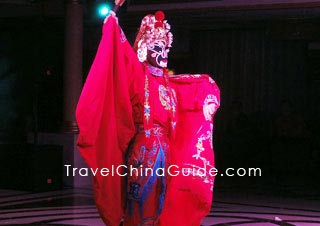China Sichuan Opera

Magical Face Changes in Sichuan Opera
Face changing is the highlight of Sichuan Opera. It is said that ancient people painted their faces to drive away wild animals. Sichuan Opera absorbs this ancient skill and perfects it into an art.
Three Types of Face Changes
![]() The Blowing Mask routine works with powder cosmetics, such as gold, silver, and ink powders. Sometimes a tiny box is placed on the stage; the actor draws near and blows at the box. The powder will puff up and stick to the face. Sometimes the powder is put in a cup. The secret to success in this act is to close the eyes and mouth and to hold the breath.
The Blowing Mask routine works with powder cosmetics, such as gold, silver, and ink powders. Sometimes a tiny box is placed on the stage; the actor draws near and blows at the box. The powder will puff up and stick to the face. Sometimes the powder is put in a cup. The secret to success in this act is to close the eyes and mouth and to hold the breath.
![]() The Pulling Mask routine is the most complicated. Masks are painted on pieces of damask, well cut, hung with a silk thread, and the lightly pasted to the face one by one. The silk thread is fastened in an inconspicuous part of the costume. With a flick of his cloak the performer magically whisks away the masks one by one as the drama develops.
The Pulling Mask routine is the most complicated. Masks are painted on pieces of damask, well cut, hung with a silk thread, and the lightly pasted to the face one by one. The silk thread is fastened in an inconspicuous part of the costume. With a flick of his cloak the performer magically whisks away the masks one by one as the drama develops.

One Sichuan Opera master also used Qigong movements as he changed face color from red to white, then from white to black.
Face changing is a magical art. Actors change more than 10 masks in less than 20 seconds! By raising the hand, swinging a sleeve or tossing the head, an actor uses different masks to show different emotions, expressing invisible and intangible feelings through visible and tangible masks. From green to blue, red, yellow, brown, black, dark and gold, these masks show fear, tension, relaxation, slyness, desperation, outrage, and so on.
Sichuan Opera master Peng Denghuai changed 14 masks in 25 seconds, and reverted to four masks after revealing his true face. This was his latest Guinness World record, breaking his previous one. Hong Kong super star Andy Lau was said to respect Mr. Peng as teacher and mentor in this stunt.
Today hi-tech is used to enhance this traditional art. Lasers and twinkling lights add a touch of mystery. And modern faces like Zorro are invited to the stage.
Sichuan Opera, like hot-pot and other Sichuan cuisine winners, is exciting, rich and good-natured.
|
|
- Last updated on Aug. 08, 2022 -
Questions & Answers on China Sichuan Opera
Asked by Sue from INDIA | Oct. 16, 2019 01:41 Reply
Reply
Hello, which theater will you recommend? Is Magical Face Change part of Sichuan Opera,
or do we book for another show. thanks
Answers (1)
Answered by Lavelle from GERMANY | Oct. 17, 2019 00:07 0
0 0
0 Reply
Reply
Chengdu Shufeng Yayun Theater is highly recommended. It is located at No.136, Qintai Road, Qingyang District. Hope helpful!
Asked by Noga from ISRAEL | Apr. 18, 2019 08:52 Reply
Reply
Hi, I would like to see the opera shaw but I dont know Chinese... how can I order tickets?
And thank you for all of this halpfull articles.
Answers (1)
Answered by Hailey from USA | Apr. 18, 2019 19:33 0
0 0
0 Reply
Reply
The tickets booking sites are only in Chinese and you can purchase the tickets when you arriving at the theater.
Asked by Maria from INDONESIA | Sep. 28, 2016 10:27 Reply
Reply
Hello! We will stay at Forstar Hotel North Renmin Road. Is the Shufeng Yayun Tea House nearby?
How to get to it from our place (any public transport or taxi)?
Thanks in advance!
Thanks in advance!
Answers (1)
Answered by Lena from DENMARK | Sep. 28, 2016 20:50 1
1 0
0 Reply
Reply
Maria, you can take subway line 1 at North Renmin Road to Tianfu Square where you can transfer to line 2; alight at Tonghuimen and use Exit E and walk south along Qintai Road for a few yards and you will find the tea house on your left side.
Asked by Samy rajoo from SINGAPORE | Oct. 01, 2015 22:54 Reply
Reply
Why do some Chinese opera performers have a red dot on their foreheads? Thank you :)
Answers (2)
Answered by Cindy from HONG KONG | Oct. 09, 2015 04:39 2
2 3
3 Reply
Reply
Samy, there are not only red dots but also other patterns. These "decorations" are used to reflect the role's characteristics. Meanwhile, the audience can easily figure out what roles the performers play by these unique decorations. Take Yang Jian for example, another eye is added on the performer's forehead. It says that Yang Jian has three eyes. Lei Gong (God of Thunder) has a lightning bolt pattern on his foreheads.
Answered by R Thirumal samy from SINGAPORE | Oct. 09, 2015 07:06 0
0 0
0 Reply
Reply
Thanx soooo much :)))

